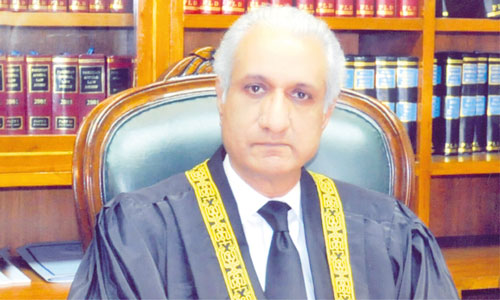Supreme Court Justice Ijazul Ahsan observed on Friday that during elections, voters stamped on a party’s electoral symbol which meant that lawmakers contesting on a party’s electoral symbol were bound by party discipline.
He made these remarks during the hearing of a presidential reference seeking the Supreme Court’s opinion on Article 63-A – which deals with a parliamentarian’s disqualification for defection – of the Constitution. A five-member bench, comprising Chief Justice Umar Ata Bandial, Justice Ahsan, Justice Mazhar Alam Khan Miankhel, Justice Munib Akhtar and Justice Jamal Khan Mandokhail heard the petition.
Earlier in the hearing, Justice Mandokhail asked if any member [of the National Assembly] could express no-confidence against the prime minister.
At this, Attorney General of Pakistan (AGP) Khalid Jawed Khan said that a party ticket is a certificate that bears the electoral symbol. He said MNAs elected on reserved seats for women and minorities do not receive votes from the people, and instead they are nominated by their parties. Some of the MNAs elected on reserved seats were also present at the Sindh House, he said, referring to dissident PTI lawmakers. There is a difference in the oath of the prime minister and an MNA, he pointed out.
He said that in the subcontinent, political parties such as the Congress and Pakistan Muslim League were formed in the names of great leaders and still continue to exist. In a parliamentary democracy, the AGP said, parliamentary sessions are held, but MNAs are not supposed to be “rubber stamps”. If they don’t agree with the party’s decision, they may resign, he suggested, adding that differences with the party didn’t mean going against the government.
Justice Mandokhail remarked that the Constitution gave everyone the right to free expression of their views. “Should [an MNA] be disqualified for expressing their views?” he asked. Chief Justice Bandial, however, observed that the Holy Quran mandated severe punishment for dishonesty. “A person who breaks trust is called a traitor,” he remarked. “But does a member declare to be bound by the party?” he questioned, and then asked the AGP when should an MNA be declared a defector. He added that the Constitution did not specify anywhere that MNAs were required to be loyal to their parties. “Article 62(1)(F) talks about qualification, not disqualification,” Justice Bandial said. Justice Munib Akhtar, too, asked whether Article 62(1)(F) would be applied upon violation of Article 63-A, noting that Article 63-A talked about vacating seat.
Here, Justice Mandokhail inquired if an MNA had ever resigned after casting their vote. AGP Khan replied that it had happened in India and the Supreme Court had declared the member a defector. “Nobody can be encouraged to deviate from the party,” he added. Justice Mandokhel said the president could have called a meeting of political parties with representation in Parliament and discuss the issue with them before filing a presidential reference.
Justice Ahsan, here, remarked that the president had asked for the interpretation of the Constitution and the court could not drift away from that.










